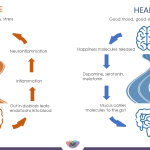The vagus nerve is the longest and most complex of the twelve cranial nerves that connect your body to your brain. It stretches from your brainstem down through your gut, regulating your heart rate, breathing patterns, blood pressure, and more. The nerve gets its name from the Latin word meaning “wandering,” which accurately describes the vagus nerve as it is considered to have the widest distribution of all nerves within the human body.
The vagus nerve serves as the body's superhighway, carrying information between the brain and the internal organs and controlling the body's response in times of rest and relaxation. It has several sensory functions and its branches control everything from swallowing and speech to critical control of the parasympathetic nervous system, the “rest and digest” counterpoint to the sympathetic “flight or fight” system. In addition, this nerve controls the function of the most significant organs in the body and signals the release of many regulatory hormones and neurotransmitters.
The vagus nerve is the primary connection between the brain and the gut and the body’s “second brain,” the enteric nervous system. It transmits signals from the brain to move food through the digestive tract (it controls everything from chewing to pooping) and from the gut and its microbiome to the brain, affecting not just digestion but also mood and inflammation response.
What Happens in Vagus...Does Not Stay in Vagus
When we experience chronic stress or don't give ourselves enough rest, this vital connection can be compromised - which can cause a tidal wave of symptoms throughout the body. The vagus nerve controls the parasympathetic response, which is the vital system that holds the body in stasis and allows it to “rest and digest.” When the body remains in “fight or flight” for extended periods, as it tends to do when under chronic stress, our vagus nerve is understimulated and unable to perform appropriately on multiple levels. In the near term, you might experience indigestion and stomach upset due to lack of digestive acid, constipation or diarrhea due to lack of motility in the intestines, hoarseness, headaches, and a racing heart. Long term, lack of vagus nerve function can increase your risk of depression and anxiety, insulin resistance, and cause heart palpitations.
Get Your Nerve In Shape
There are ways to stimulate and improve the vagus nerve tone, which is great news because healthy vagal tone improves emotional regulation and physical health overall. Here are some simple techniques to improve vagal tone.
Take a Deep Breath
One of the main ways to stimulate the healthy function of the vagus nerve is through deep, slow belly breathing. Breath-holding activates the “fight or flight” response; it tends to increase the sensation of pain, stiffness, anxiety, or fear, and is, interestingly, one of the first instinctual responses to danger.
A technique called “4-7-8 Breathing” is an excellent structure for deep breathing. To practice 4-7-8 Breathing, inhale through your nose for four counts, hold for seven counts, and exhale through your mouth for eight counts. Breathe from the belly. Think about expanding your abdomen and widening your rib cage as you inhale.
Annoy Someone (aka Gargle or Sing Loudly)
Loud gargling or loud singing activates our vocal cords which stimulate the portion of the vagus nerve that innervates the larynx and pharynx. Better yet, sing WITH someone. The vagus nerve is literally wired for human connection and responsible for releasing oxytocin and serotonin in the body.
Stimulate the Diving Reflex
Dunking or immersing your face in cold water activates the vagus nerve and “shocks” the body back into a parasympathetic response. Immerse your forehead, eyes, and at least two-thirds of both cheeks in cold water. This action slows your heart rate, increases blood flow to the brain, and relaxes your body.
Practice Mindfulness and Self-Compassion
Studies show that mindfulness meditations create healthy vagal tone in participants. Our favorite, especially when we’re having a difficult day, is the “Self-Compassion Break” by Kristin Neff. You can walk yourself through this two-minute meditation here.
Focus on Gut Health
When the microflora of the gut is out of whack, the vagus nerve is too. So perhaps one of the single most important changes you can make in your quest for optimal health is to make your gut microbiome happy. Check out our blog posts here and here for some great tips. Not only will it affect your digestion, but studies show that a healthy gut-brain connection is critical to your overall mental health.
Get Adjusted
Regular chiropractic adjustments can relieve nerve interference caused by subluxations (misalignment of spinal vertebra) and ensure all the messages your nervous system is carrying get delivered appropriately.
The vagus nerve is a critical connection in your body, and keeping it in tip-top shape is vital to optimal health. Following these simple strategies will help you keep your vagus nerve humming along perfectly!




Recent Comments